-
What We Do
- WHERE WE WORK
-
About Us
 Welcome Message from Carol Jenkins
Welcome Message from Carol JenkinsFor more than 90 years, World Learning has equipped individuals and institutions to address the world’s most pressing problems. We believe that, working together with our partners, we can change this world for the better.
On my travels, I’ve had the opportunity to meet with many of those who have joined us in this mission. In Baghdad, we’ve trained more than 2,300 Iraqi youth who are already giving back at home. In London, our partners in the TAAP Initiative strongly believe that we are all responsible to practice inclusion. And in Vermont, our Experiment in International Living and School for International Training participants prove every day that they have the tools and the determination to change the world.
Please join us in our pursuit of a more peaceful and just world.
- Get Involved
Media Center > Story
The Longest Trip: How The Experiment and World Learning created a new bond for a grandmother and her granddaughter
September 21, 2022
Marilyn Gordon was inspired to write about her 1954 Experiment trip to Austria, a story that in the end, formed a new connection with her granddaughter through World Learning.
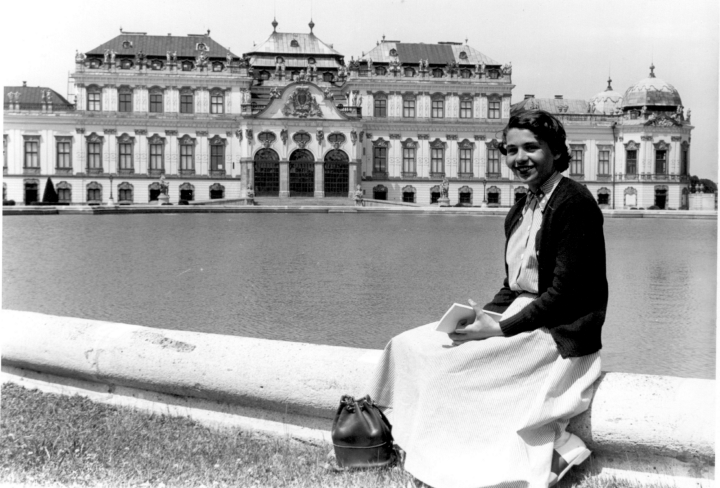
Like The Experiment in International Living, Marilyn Gordon turned 90 this year. She celebrated her milestone birthday earlier this month, enjoying delivered flowers, outings with loved ones, and well wishes given on Zoom and in church. And she looks forward to reading one of her birthday gifts — a book about the RMS Lusitania, a British ocean liner that was once the world’s largest passenger ship. This is not surprising, given that Marilyn herself has experience crossing the Atlantic Ocean by ship.
A past gift from her son and daughter-in-law helped bring this story to life — a subscription that uses email prompts to help write a book. With this gift, Marilyn was inspired to share the details about the longest trip of her life — when she traveled to Austria with The Experiment in the summer of 1954.
“My dad drove me to Hoboken, New Jersey, where my college roommate met me to see me off on the Holland-American ship, SS Waterman, for a seven-day cruise to Rotterdam, Holland,” Marilyn says. The Experiment wouldn’t switch from ship transport to air travel until 1958, but the extended time at sea did not bother Marilyn. In fact, she has fond memories of it. The week aboard the ship allowed her to bond with the six other Experimenters in her group and their group leader.
“The crossing was smooth sailing, did not cause too much sea sickness, and gave us lots of time as a group to get to know each other, learn what to expect from our host families, practice our German, and learn about Austria and the other countries we were to visit,” Marilyn says. She even remembers learning German idioms and new customs in an experiential style through acting out plays.
“For someone as sheltered as I was, the goal of The Experiment was to broaden my life’s experience. Travel does that — opens your world view.”
The second leg of the group’s trip was a train ride from Rotterdam through Germany to Salzburg, Austria. From there they caught another train to their ultimate destination, Vienna.
“It was a long train ride with all of us in one compartment, me with a head cold, and little room to sleep,” Marilyn says. When her host brother Pepo met her at the train station with a bouquet of red and white carnations representing Austria’s flag colors, she was relieved.
They headed to her host family’s home, just over a mile from Vienna’s Innere Stadt (Inner City) district. Here she met her host parents Herr and Frau Doktor Nagler and sister Hema, who all insisted Marilyn use the German word “du,” the more familiar form of “you” versus the more formal “sie.”
“They were always concerned about my welfare, asked about my family often, and were eager to help me in any way,” Marilyn recalls. “Pepo was my constant companion and guide. He had a great knowledge of the city, and we walked everywhere, so I had a close-up of all the many parts of Vienna.”
Pepo was especially proud to point out St. Stephen’s Cathedral, one of the tallest churches in the world. His family had purchased a tile to help replace the roof after a fire caused by World War II damage had destroyed it in 1945.
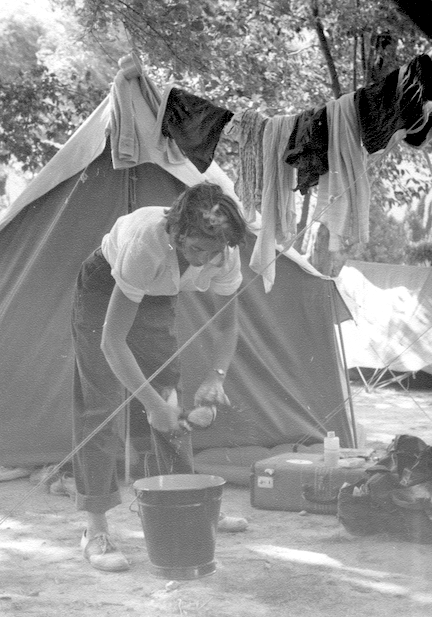
After the war, Austria remained under Allied occupation until the Austrian Independence Treaty in 1955. Vienna was divided into four zones and jointly occupied by the United Kingdom, the Soviet Union, the United States, and France. Even in 1954, Marilyn remembers each of the four quadrants looking and feeling distinct, as well as having their own soldiers on the ground.
Traces of the war lingered in smaller ways too. The Naglers opposed Nazi Germany and took every precaution to safeguard themselves. Marilyn remembers they still had four to five locks in place on their apartment door almost a decade later.
“For someone as sheltered as I was, the goal of The Experiment was to broaden my life’s experience,” she says. “Travel does that — opens your world view.”
Did it also give her confidence? Yes. She hadn’t at the time — nor to this day — done anything as demanding as forcing herself to learn another language and live with a community of strangers.
Add to this that her Experiment trip involved an 18-day camping excursion to the Dolomite Mountains of Italy.
“I had never camped before. I had never tented before. That was a whole new experience,” she says. The trip included walking on the Grossglockner’s glacier slope, Austria’s highest mountain; visiting St. Mark’s Square in Venice; and seeing the four-act opera “Aida” in Verona.
“The bus had one flat tire and a collapsed roof when one fellow went through it getting luggage down,” she says. All this before arriving in the Italian Alps and stopping at Lake Como, “our loveliest camping spot.”
Upon returning to Vienna, most of Marilyn’s cohort left for a final excursion to Germany. But she headed to Switzerland to visit relatives before reconnecting with the group for a boat trip up the Rhine River and back to Rotterdam. The journey home provided additional firsts when their ship had to remain at sea for an extra day to allow a hurricane to pass.
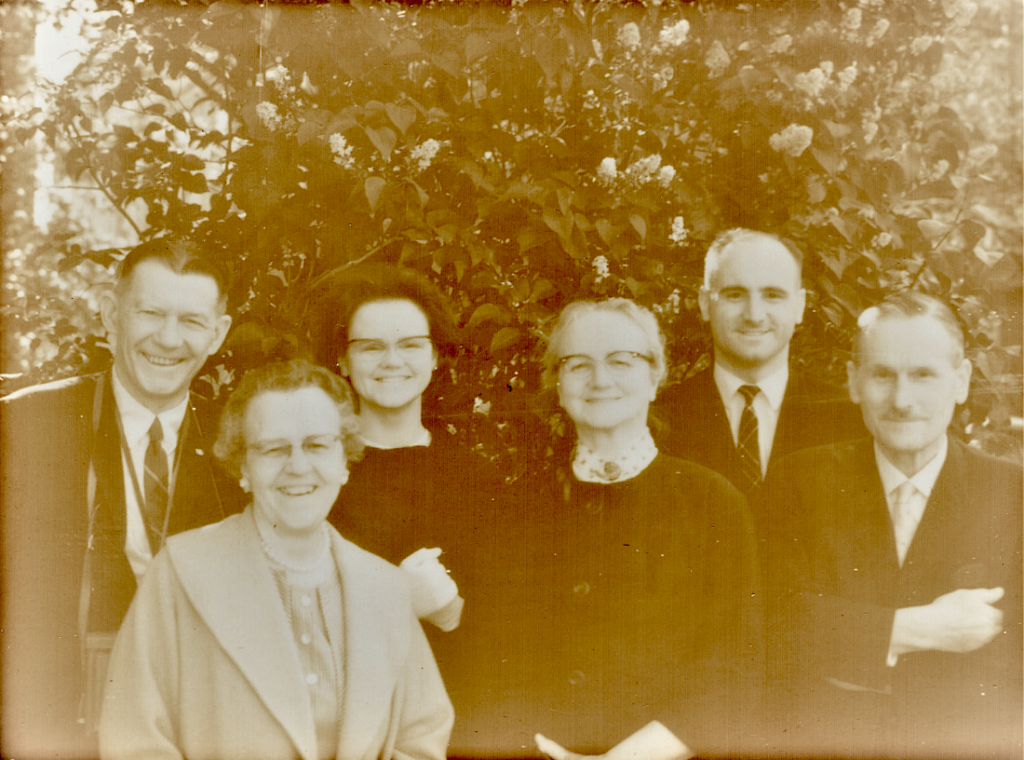
Marilyn’s Experiment story, as is the case for many Experimenters, continued well past the summer of 1954. For many years, she stayed in touch with her group leader and several students from her cohort and maintained life-long bonds with her host family.
Pepo moved from Austria to Australia, but his business involved travel, so he would often visit Marilyn and her husband in the U.S. On one visit, Hema joined, which “was a real treat.” And her own parents, on a vacation to visit their Swiss relatives in 1964, made a special trip to Austria to stay with the Naglers.
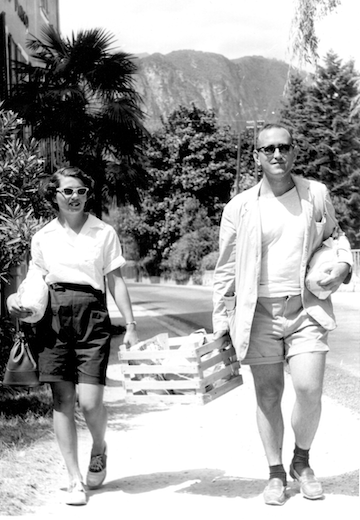
With the help of the storytelling subscription, Marilyn wrote about all of this and more. The gift included an option to print a hard-cover book complete with photos, resulting in a very special keepsake titled “One Lifetime.”
But if one final section could be added, it would be about her granddaughter Hallie Skripak Gordon and the unique connection they discovered.
Hallie is a senior program associate for World Learning’s International Visitor Leadership Program (IVLP). She first started at World Learning in 2015 as an intern and then return to the organization in 2019 as a temporary program associate with the Leadership Development Fellowship before joining the IVLP team.
Hallie knew her grandmother had gone on a trip to Europe when she was younger — and that Vienna was a special place to her. But she didn’t know the trip was an organized program through The Experiment in International Living.
It was Marilyn who made the connection between The Experiment and World Learning.
“She is the one who made the connection between my job and her experience as a young woman,” Hallie says. “It definitely made me feel much more connected to the work I was doing.”
Hallie and her family have all participated in exchange programs. For three summers starting in high school and then into college, Hallie volunteered as a counselor and later a teacher for an English-language program in Jordan. She then worked at a school in Spain, living with three different host families. Her parents served in Ecuador with the Peace Corps and later hosted two exchange students from Europe — one from Vienna — when Hallie was growing up.
“The beauty of exchange is that there is no teacher and student, but rather equal sides sharing and learning from each other. As a result, the lessons learned are more deeply internalized and the impacts more enduring.”
Like her grandmother, Hallie believes her own experiences abroad were formative.
“My experiences helped inform my political identity, increased my interest in public service, made me a better communicator, and grew my sense of independence and self-confidence as a young woman,” she says.
“The beauty of exchange is that there is no teacher and student, but rather equal sides sharing and learning from each other. As a result, the lessons learned are more deeply internalized and the impacts more enduring.”
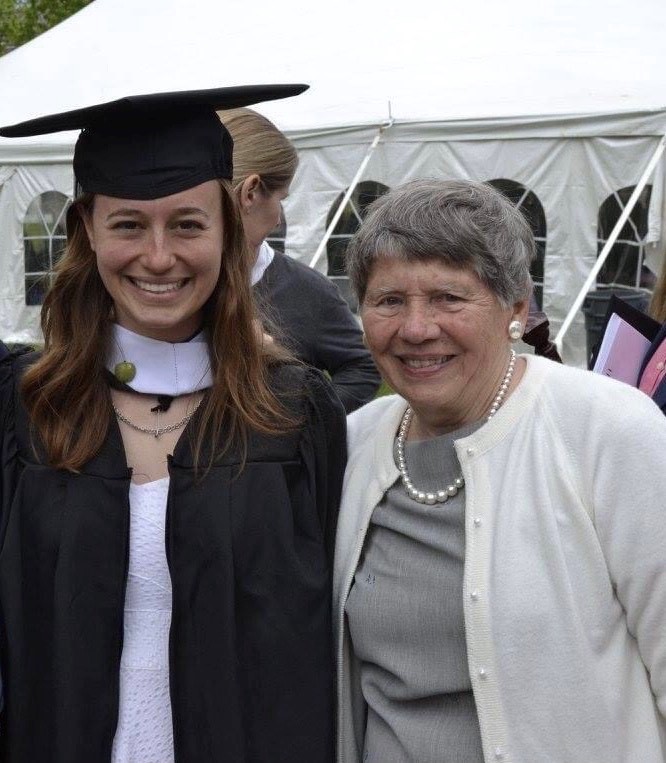
Marilyn and Hallie have always been close. Marilyn says Hallie has been “the light of my life since her birth.” But has the discovery that they are further connected through World Learning created an additional bond?
“Absolutely,” Hallie says. “She rarely talked about her experience in Vienna before I started working at World Learning, but the more I ask her about her time there, the more I feel like we graduated college with the same adventurous mentality. Working at World Learning helps me appreciate how intentional her exchange experience was.”





